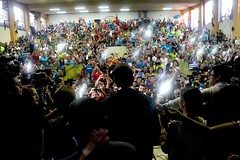Prince of Peace
By Juan CarlosThough San Salvador’s Mercado Central is statistically one of the most dangerous zones of one of the most dangerous cities in the world, an outsider wouldn’t know it just by walking through. It is, admittedly, congested, stretching across a few dozen blocks that throb with tens of thousands of vendors, clogging the roads of the Salvadoran capital’s heart with makeshift stalls and tables that spill over with anything you could think to buy: stacks of clothes and fruit, underwear, cheap plastic toys, bars of soap, knockoffs of coveted North American brands—Levis, Converse, Adidas, Nike. Women hawk tamales and bags of cut papaya, or ladle steaming coffee into flimsy Styrofoam cups that buckle from the heat. Boys push wheelbarrows of ice water, bananas, and mangos past rows of mannequins modeling cheap leggings for sale. This is one-stop shopping at its most frenetic. Life and commerce thrum. Violence here is largely invisible—until, of course, it isn’t.
San Salvador is both the political and homicide capital of El Salvador, a country where, most recently, a plague of murders has surged after the unraveling of a two-year-old gang truce in early 2014. Gangs have been running Mercado Central for years; according to Salvadoran journalist Oscar Martinez, in a 2015 report on the swelling of violence in the city center, they tell vendors “where they will sell, how much they will pay for the space to sell…Sometimes they even tell them who to vote for.”
 |
| Calle Ruben Darío 2015 |
This is an ambitious project for Bukele, an upstart politician who, at thirty-three, and with just three years of experience in public service, won the most important mayoral seat in the country in 2015. Previous mayors have attempted to physically remove unregistered vendors from Mercado Central, which led to all-out riots. Bukele’s strategy is to entice them to move by building new markets just outside the city center (construction is slated to be completed by 2018).
Instead of haggling from makeshift stalls in the middle of sidewalks and roads, his plan would allow vendors to operate through leases, in conditions that are safe and sanitary, with plenty of security and opportunities for a diversity of businesses to thrive.
The plan, known as la Reordamiento (the Reordering), also calls for the revitalization of the city center, where the country’s oldest and most majestic buildings—including the city’s main cathedral and the national theater and library—stand in disrepair, nearly forgotten. Such an aggressive embrace of gentrification is Bukele’s way of addressing a fundamental disconnect between the rich and poor in Salvadoran culture, which he sees as one of the root causes of the country’s violence. If you know your neighbors, Bukele explains, you won’t try to kill one another.
Read the rest of this story at The Virginia Quarterly Review online.

















0 comments:
Post a Comment